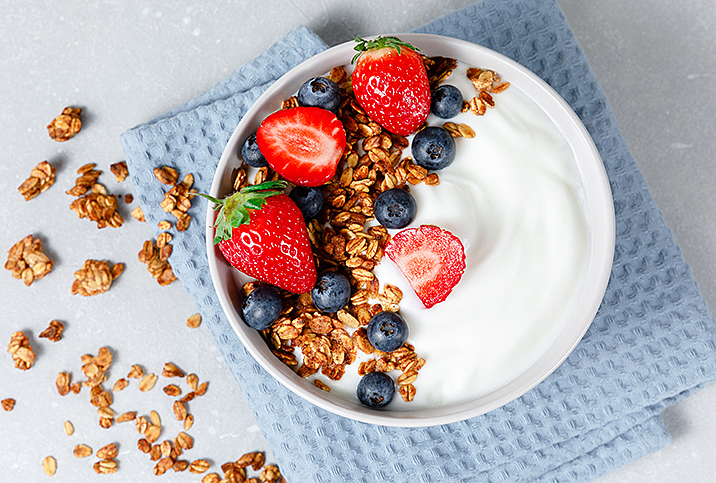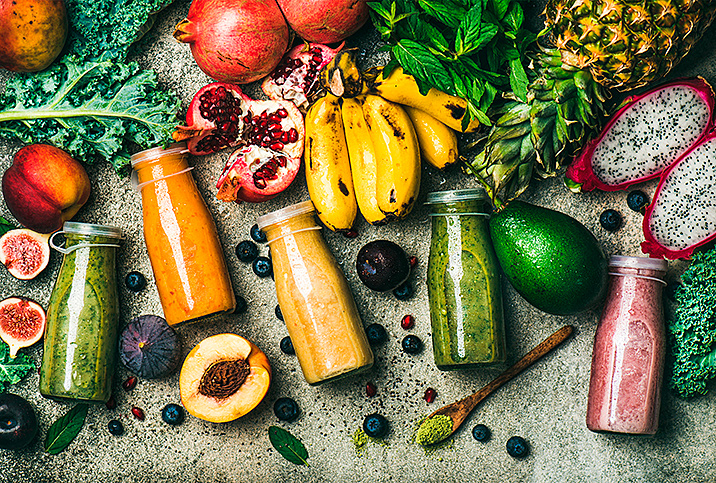6 Superfoods Worth the Hype (And 3 That Aren't)

Perhaps unsurprisingly, the word "superfood" was coined by marketers in an attempt to increase the appeal of certain products—and, subsequently, their price tags.
In fact, "This term originated in the early 20th century as part of a marketing strategy for bananas," said Jinan Banna, a registered dietitian and associate professor of nutrition at the University of Hawaii.
If my Instagram feed—which is routinely inundated with meticulously arranged porridge bowls, questionable uses of coconut oil and aesthetically pleasing presentations of kale—is any indication, the approach was successful. Superfoods are still trending and the buzz doesn't appear to be dying down.
Today, dozens of foods, from oats and bananas to bone broth and celery juice, have purportedly achieved "super" status. But does the term really mean anything or is it as flimsy as a potato chip? We talked to experts to find out which are and aren't worth the hype.
What exactly is a superfood?
Most whole foods—including fruits and vegetables, whole grains, nuts, seeds and legumes—provide multiple nutritional benefits, such as a source of fiber, protein, healthy fats, vitamins or minerals. Broadly speaking, superfoods are ones that bring a little something extra to the table, such as antioxidants or probiotics, said Shelley A. Rael, a registered dietitian and nutritionist at Eat Live Be Well Nutrition. These bonus elements may enhance overall health or address certain conditions.
"In the 'superfoods,' there are often the multiple benefits these nutrients supply, of not just meeting basic needs for human health but reducing the risk of chronic diseases, such as certain cancers, heart disease, [and] type 2 diabetes, and diseases of aging, such as dementia/Alzheimer's and high blood pressure," Rael explained.
Deserving of the title
Oats
Oats contain a high amount of fiber, which supports digestion, promotes healthy gut bacteria and reduces "bad" cholesterol. These unrefined whole grains are also a good source of protein, manganese, magnesium, phosphorus, copper, zinc, folate, vitamin B1, vitamin B5, iron, polyphenols and antioxidants, including avenanthramides.
"Oats are something I eat every day because they are filling due to their fiber and help with reducing the risk of heart disease, and they are low cost too," Rael said. "And it isn't just oatmeal, I also add it to my smoothies."
Chia seeds
"They are a source of omega-3 fatty acids, which are considered an essential fat. They also contain fiber, protein and vitamins and minerals," Banna noted. "The various nutrients found in chia seeds may help protect against chronic disease."
Omega-3s account for 60 percent of chia seeds' fat content. These essential fats—which can also be found in high amounts in flax seeds, walnuts and fatty fish like salmon, tuna and sardines—may positively affect cardiovascular and mental health, among other benefits.
Cacao or dark chocolate
As with other superfoods, cacao has been used medicinally for thousands of years. Cacao nibs are crumbled cacao beans. The same beans are used to produce chocolate, and both deserve superfood status, said Ellie Busby, a registered nutritionist and founder of Vojo, a nutrition plan company.
"[Chocolate products] contain high levels of cacao flavonoids, which have so many evidence-based health benefits for brain health, cardiovascular, fitness and more," Busby said.
To be clear, this pertains to dark chocolate, not milk chocolate. The latter usually contains high levels of sugar and not much cacao. Although chocolate may be advertised as "dark" if it has 50 percent or more cocoa solids, most experts advise products with at least 70 percent cocoa solids are the most nutritious. For reference, cacao is the raw, unprocessed version of cocoa, and tastes slightly more bitter than cocoa products.
"I think dark chocolate is underrated," Busby explained. "People consider cacao nibs a superfood, but what about 70 percent dark chocolate? There are so many benefits. And actually, there may be even more benefits to eating 'normal' dark chocolate as opposed to raw cacao because the fermenting and processing can make some of the nutrients more bioavailable."
Mushrooms
Even generic mushrooms can provide substantial nutritional benefits, including vitamin D, glutathione and ergothioneine, which may improve immunity and cognition.
"Most people don't even think of them as anything other than an ingredient," Rael said. "But they do have plenty of nutrients and can really help 'extend' meat without a lot of additives, a long ingredients list or calories."
Extending involves replacing half the meat with chopped mushrooms. As vegetarians and vegans know well, mushrooms can substitute meat entirely.
Certain mushroom species—including Lion's mane, reishi, chaga and cordyceps—can provide additional advantages. Lion's mane, for instance, has long been a staple of traditional Chinese medicine. Evidence suggests it may stimulate nerve growth factor synthesis and enhance focus and cognitive function. Some studies suggest it may be useful as a treatment for multiple sclerosis, though more research is needed. And cordyceps mushrooms—popular uses of which include "mushroom coffee"—may improve athletic performance and heart health, reduce inflammation and help manage type 2 diabetes, among other perks.
Berries
Berries are packed with fiber, vitamin C and phytonutrients, including antioxidants, flavonoids and anthocyanins. Although certain berries—like blueberries and acai—are more critically acclaimed than others, all can yield substantial benefits, such as improving insulin and blood sugar levels, protecting DNA from free radical damage, reducing inflammation and diminishing collagen breakdown in the skin.
Both fresh and frozen berries are equally nutritious. In fact, as frozen berries usually enter cold storage immediately after harvest, they may contain more nutrients than their fresh counterparts.
Spirulina
Spirulina is a microalgae that grows in oceans, seas and saltwater lakes. Aztecs and other Mesoamerican peoples, as well as certain Central African tribes, were known to have used it as a food source centuries before its rise to fame on social media.
It's a rich source of antioxidants as well as calcium, niacin, magnesium, potassium, phosphorus, B vitamins and iron. It is also one of the only plant-based complete proteins—that is, it provides all nine essential amino acids.
Some less than 'super' foods…
Coconut oil
From a toothpaste substitute to a fat-melting miracle, coconut oil has been touted as the solution to a bevy of problems. Unfortunately, the evidence for most of those claims is tenuous, if not nonexistent.
"While it does have its place in cooking, it isn't the amazing weight-loss superfood it was originally purported to be," Busby said.
"There are so many things coconut oil is promoted as curing or improving, but the research just does not back it up," Rael explained. "And I have seen significant negative changes in clients' bloodwork after they got on board with the coconut oil. It is fine to use in specialty dishes and in moderation—it just isn't a magical food at all."
Goji berries
Goji berries contain high levels of antioxidants and vitamins, just like most other berries.
However, despite what their often-lofty price tag might suggest, it's not clear they're the elixir they're purported to be. There is little evidence to support claims they combat cardiovascular disease and cancer. Plus, most studies to date have used purified extracts, which are an incomparable, super-concentrated version of the dried fruits you'd find on most supermarket shelves.
Turmeric
Turmeric is another superfood hailed as a corrective for various ailments. While it is beneficial and may help with certain conditions, it isn't a miracle cure.
"Curcumin is the active ingredient in turmeric, which is a potent anti-inflammatory," Busby said. "However, you'd have to eat five tablespoons of turmeric per day to get enough curcumin to have any impact."
Unless you're guzzling golden milk lattes (or even if you are), that might be tough to stomach.
Underrated up-and-comers
Cranberries
Cranberries might not be as glamorous as goji or acai, but they pack a powerful nutritional punch. They're rich in polyphenols, fiber and vitamins, and carry other benefits. Most people are aware of their use in preventing UTIs, but some research indicates they might help slow cancer progression, promote oral health and reduce the risk of heart disease.
"I like cranberries and think they need a super status, but I have been saying that for over five years," Rael said. "They are certainly an underappreciated berry that people only think about in November."
Tempeh
Tempeh, a fermented soy product, is a complete, plant-based protein like spirulina. It also provides various vitamins and minerals and prebiotics and probiotics.
"Tempeh should also see a surge in popularity—even more so—this year," Busby declared. "With twice the protein content of tofu, plus the added benefits of being fermented, I can see why more and more companies producing tempeh are popping up."


















